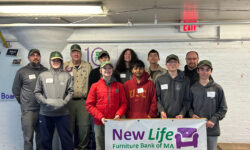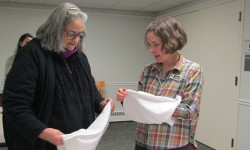New Life Furniture Bank of MA, a non-profit organization committed to providing gently-used, donated furniture and other necessary household items at no cost to clients recovering from homelessness, has announced that it has served more than 1,800 families and individuals since its creation five years ago. In addition, as the organization’s outreach continues to grow with frequent referrals from some of Boston’s largest agencies addressing homelessness, New Life volunteers have set a goal to help 650 clients and their families in 2019.
“There are so many people at risk,” said New Life Furniture Bank’s Barbara Yates. “People are just one event away — whether it’s the unexpected loss of a job, a family illness, the loss of a partner or parent, or some other kind of catastrophic thing that can happen. One event can send people into such a difficult situation that they have to seek shelter and put their furniture in storage. If they don’t have a job, then they can’t pay for the storage and they lose that. Then they have nothing, and unfortunately that story is all too common.”
The concept for New Life took shape in 2013 when Barbara’s husband, Ron Yates, who had recently retired from a career in business management, and friend Doug Marshall, who now serves as New Life’s president, were having a conversation about places where Marshall could donate furniture.
Simultaneously, Marshall and the Yates were part of a group of friends who had done nonprofit housing work together and shared a passion for community service. With steep real estate prices posing challenges for more construction endeavors, this group of ready volunteers had been searching for additional ways to help those in need. A visit to Household Goods furniture bank in Acton, MA prompted an idea.
“Ron and Doug looked at each other and said, ‘We could do this,’” Barbara Yates said.
Today, New Life is primarily run by volunteers, with more than 50 volunteers needed each week for a wide range of essential roles — from picking up furniture donations with the organization’s truck on Saturdays and accepting donations at the donation center on Elm Street, to unloading, inspecting, repairing and organizing the items on the donation center floor. There are volunteers who build practical, smaller-sized dining tables, items that are often needed to accommodate apartment space. There is a volunteer who curates donated artwork, framing the pieces and making them ready to brighten a new home. There are also client hosts, volunteers who personally greet individuals and families at the donation center and thoughtfully guide them through the furniture selection process as they consider what is needed and practical for a client’s new space.
“When we started New Life, we never expected the huge number of dedicated volunteers who make everything possible,” said Ron Yates. “We have been developing our own community of people with a shared vision and huge hearts. Volunteers are engaged in rewarding activities and are making new friends in the process with folks they may otherwise would not have met. This has been exciting to watch.”
Another unexpected and critical part of the organization’s growing outreach has come from referrals from 100 social service agencies, with a group of about 10 of New Life’s most frequently referring agencies. This core group includes The Pine Street Inn, Rosie’s Place, FamilyAid Boston, Hearth, Inc., HomeStart and the Veteran’s Administration — all large Boston groups in the nonprofit sector.
“New Life is perfect,” said staff of Hearth, Inc., an organization that provides services to address elderly homelessness and other adult homelessness. “After clients get housing it is not the end of the journey. Once their apartment is furnished they feel comfortable and it helps get their mind set out of homelessness. They can call it home. When they get housing they are happy, when they get the furniture they are ecstatic.”
“New Life is an innovative organization because of its commitment to supporting families in our communities who need these items most as they rebuild their lives after trauma or homelessness,” said President Monalisa Smith of Mothers for Justice and Equality (MJE), a Boston group that recently discovered New Life’s services. “New Life volunteers’ ability to continuously manage high volumes of donations coming in and going out, all while providing families the dignity and respect they need and deserve, make this an exceptional organization.”
Like so many of New Life’s referring agencies, MJE was created to support women and families once trauma has taken place. MJE’s particular focus is on helping families recover after street violence, and it offers women a variety of programs to help become agents of change in their communities and prevent violence from happening in the first place. MJE partners with author Andrea Cale in an initiative called The Good News Experiment, an effort to recognize individuals and organizations doing exceptional work in their communities with feature stories that appear online, in print media and on social media. Half of the honorees come from MJE’s service area, while the other half of the honorees work in a variety of service areas, with New Life Furniture Bank being their most recent “good news” feature story honoree.
New Life volunteers said that they believe that there aren’t any furniture banks closer to Boston because of the high cost of real estate and challenges in attracting and organizing volunteers.
“Our clients — and so many others — have a difficult time finding housing in Greater Boston,” said Laura Stanton, New Life’s Volunteer Coordinator. “Typically, our clients have fought long and hard to get a voucher for affordable housing. Many of them have been in shelters for three to five years and have been working to get the voucher, but that voucher doesn’t give them housing. They have to find affordable housing, and they often find it in areas like New Bedford and Taunton and other areas where costs are lower.”
In addition to receiving referrals from social service agencies, New Life has served as a partner in City of Boston Mayor Marty Walsh's "Boston's Way Home" initiative, a movement to end veteran and chronic homelessness in Boston. The program has helped house more than 850 individuals since its inception.
“For many, homelessness can be a one-time event, and then there is chronic homelessness, which is often connected with some other physical or mental illness that is part of the whole piece,” said Barbara Yates. “Leaders of this movement to end chronic homelessness have discovered that by providing wrap-around support services when they move into their housing, it works.”
As New Life volunteers reflect on the individuals they’ve supported in the past five years, they said it is important to emphasize that clients rebounding from homelessness or other life-altering transitions come to the donation center from a wide range of experiences and demographics.
“Homelessness is not a look, it’s a state of being, and it can really bring people down in a way that is so sad, but stereotypes can be a dangerous thing and they surely don’t work when it comes to homelessness,” Barbara Yates said. “We would really like people to see that the visual of a guy with a cup on the corner — first of all, he has a story that you may need to know — but this stereotype is damaging to the families who are struggling and the children who don’t want anyone to know. The stigma is heartbreaking and we want every child and their parents to feel the dignity and the respect that we can offer them for at least that hour when they are here.”
Stanton added that the average age of a homeless individual in Massachusetts is eight years old, an unsettling statistic that has been fairly constant in the state for the last 10 years, and that visiting New Life’s Facebook page paints a picture of many other faces and important stories.
“We have quite a few single moms visit us,” Stanton said. “About 10 percent of our clients are Veterans. There are 9,000 high school students who are homeless in Massachusetts. We often meet with elderly people who have no family. And we’re still helping Haitian refugees from the 2010 earthquake.”
Volunteers at New Life said that they’d like to hire their first salaried executive director in the next fiscal year while maintaining their vision of being part of a primarily volunteer-run organization with a focus on personal touch. As demand for the organization’s services continues to grow, they said they welcome and appreciate support from community members. Community support can be in the form of volunteering for a wide range of positions, donating gently used furniture and household items or making a financial donation to support their mission. In 2019, community members can also look forward to New Life Furniture Bank’s second annual 5K fundraiser.
More information on New Life, including a list of the most-needed furniture items and the variety of volunteer positions available, can be found on the organization’s web site: newlifefb.org.
























